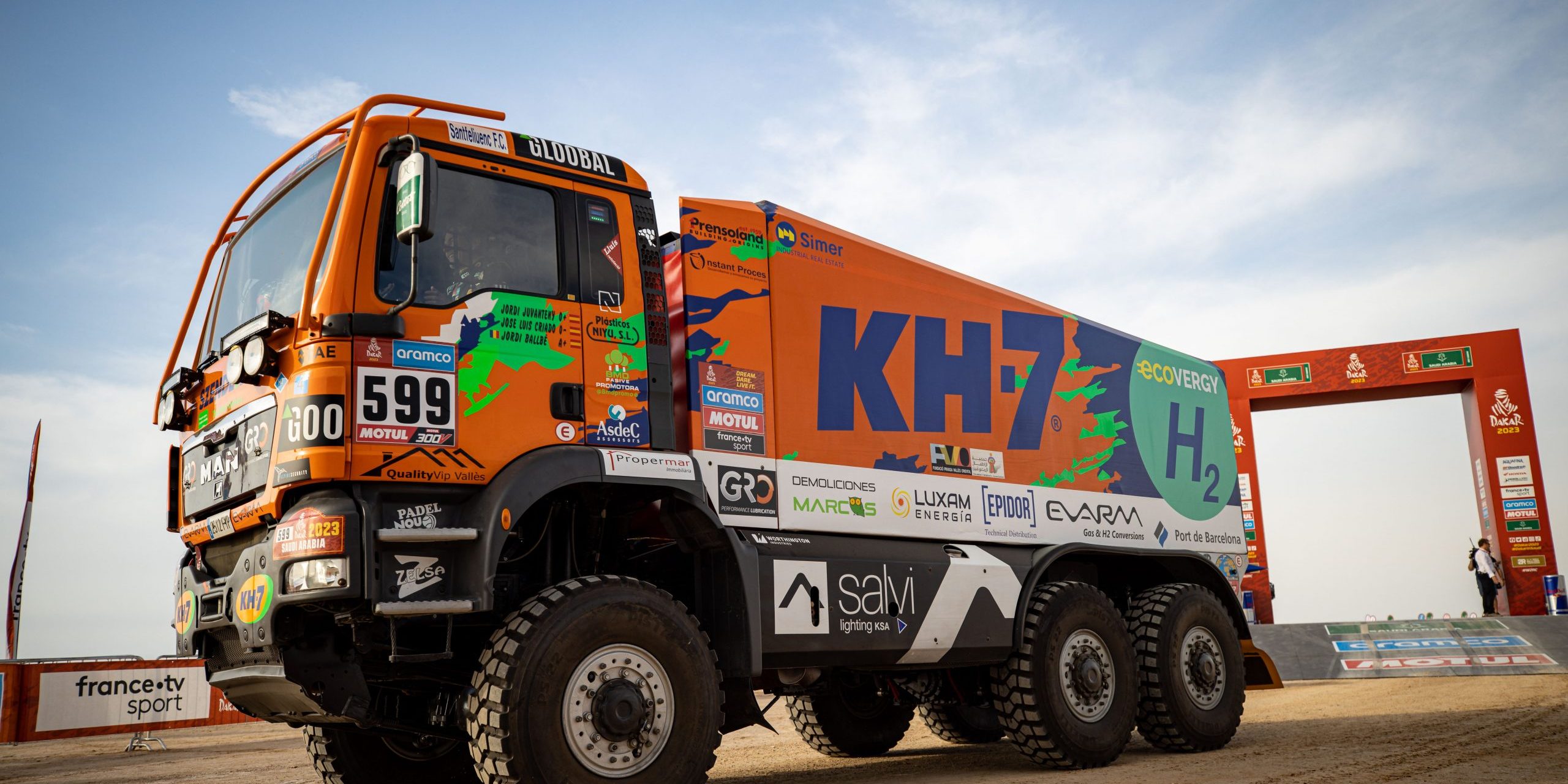The KH-7 Epsilon Team experienced a dramatic change of scenery and expectations at the start of the 2023 Dakar. The last-minute cancellation, by the International Automobile Federation (FIA), of the creation of the T5.U Hydrogen category, that had to bring together trucks powered by this alternative fuel, has motivated the creation by ASO of a new division called Challenge New Energy. This measure allows the Spanish team to officially stay in the race, but forces them to start all stages 15 minutes after the last participant and prevents them from providing assistance to other competitors in trouble during the course.
The team’s MAN KH-7 Epsilon is the first hydrogen-powered vehicle in history to compete at the Dakar rally. However, the path of any pioneer is never easy, and the experience of Jordi Juvanteny (driver), José Luis Criado (co-driver) and Jordi Ballbé (navigator) is a new example of this. This is their story:
The project of the Spanish team started last March in a previous meeting with ASO (Amaury Sport Organization), the organization of the Dakar, which accepted the proposal and shared it with the FIA. The federal entity gave its approval, understanding that the proposal was “realistic and feasible” in order to compete in the toughest rally in the world, which continues to work with the aim of promoting similar initiatives to decarbonize the race.
The first setbacks came last December, a week after the MAN passed the pre-boarding technical checks in France, and with the vehicle already sailing on its way to Arabia. The FIA communicated by email that none of the projects linked to hydrogen, except for the KH-7 Epsilon Team, was going to make it to the start of the Dakar, and that it decided to postpone the implementation of the T5.U Hydrogen regulation. Finally, on December 30, and after multiple number changes, the organization contacted the team to notify them that they were out of the FIA T5 category and had to compete within the framework of a newly minted division: the Challenge New Energy. The organization also offered an alternative to Juvanteny, Criado and Ballbé to be able to return to the T5 division: abandoning hydrogen and opting for traditional diesel.
Faced with this dichotomy, the members of the KH-7 Epsilon Team decided to go ahead with their initial plans and tackle the 2023 Dakar with their MAN powered by a mixture of hydrogen and diesel. However, this path implies two particularly notorious handicaps: the first and most important affects their classification, since, although they compete in the real, regulated race and with their own daily classification, they are forced to take the start in all stages 15 minutes after the last participant, whatever their position at the end of each day. This circumstance makes the 2023 edition the most important challenge in the team’s history, since it will have to complete the daily route in the worst possible conditions, with a road surface seriously damaged by the passage of all the vehicles in the caravan and driving for many more hours at night, before its late start day after day. In addition, this new daily schedule will alter the schedule of their assistance, which will have to completely reorganize their dynamics in the test.
Added to this limitation is another aspect that clashes head-on, by regulation, with one of the hallmarks of the KH-7 Epsilon: its status as ‘Guardian Angels of the Dakar’. The team has always been highly valued by the other participants for their availability and altruistic help in all kinds of circumstances, which will change radically this 2023, since, as they belong to a category not regulated by the FIA, they will not be able to help none of its rivals from the official divisions. Any crew in the race, therefore, runs the risk of being excluded in case of resorting to the helping hand of the components of the KH-7 Epsilon Team, if no change is made in this section by the FIA.
“Our team has been the only one to comply, already in 2023, with part of the objectives of the Dakar Future program, which works on the future decarbonization of the competition using fuels such as hydrogen. We trusted that other teams would have arrived this year, but it has not been possible. In any case, and despite the severe limitations of this new scenario, we will focus on the development of this new technology following the planned objectives. The results we obtain will be of great help to compare the performance of our MAN against other similar models powered by traditional fuels. The experience will also serve other teams and the organization itself in order to encourage more rivals to compete in the future using technological solutions that are more respectful with the environment,” said Juvanteny.
Source: KH-7







